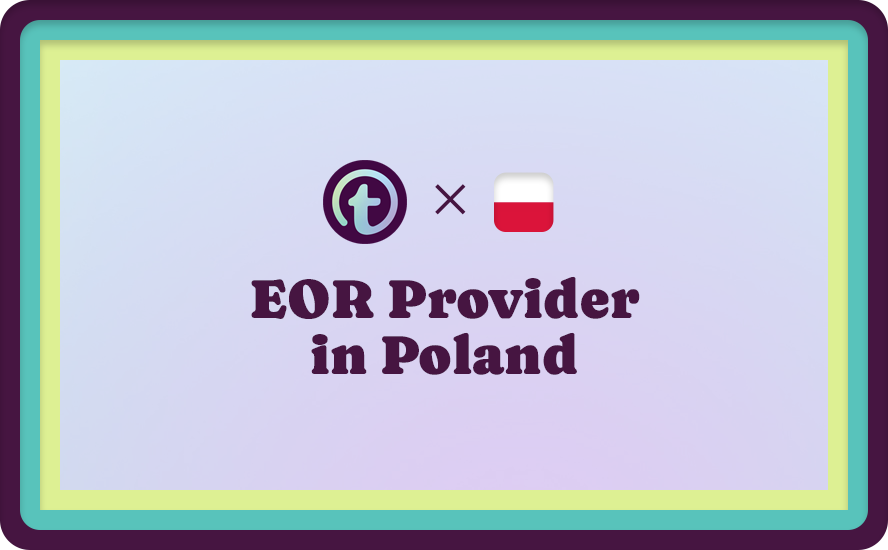
Employer of Record Services (EOR)in Poland
Tech companies are always on the hunt for premier talent – software engineers, designers, programmers, and more – and Poland provides companies with an incredible wealth of tech talent that will help take your company to the next level. With that said – recruiting, hiring, and managing remote employees across the globe is not an easy task. Truss can help you grow and expand your global remote workforce and remain compliant with local labor laws as your Employer of Record (EOR) in Poland. Truss is here to help you find, recruit, hire, and manage remote employees in Poland – handling everything from onboarding and payroll to employee benefits. With the help of Truss, you can reduce any risks involved with global hiring practices and focus on driving the success of your business.
Quick Facts About Poland
US Dollar
Polish złoty (PLN)
| Currency | Polish złoty (PLN) |
| Payroll Frquency | Monthly |
| Capital | Warsaw |
| Official Language | Polish |

Payroll + Taxation
PAYROLL CYCLE
The payroll schedule in Poland is monthly in most cases and employees must receive their salary no later than the 10th day of the next month and a 13th-month payment is not mandatory. Payments may be made in cash or by a bank transfer. Local labor laws make it legal to pay employees daily or weekly.
INCOME TAX
Income tax in Poland is a simple affair with two tax brackets – 18% and 32% – that depend on the employee’s salary and income.
EMPLOYER COST
Companies that hire remote workers in Poland can expect employer costs and contributions to add up to an estimated 19.48% – 22.14% of the employee’s salary – paid in addition to that salary.
Minimum Wage + Working Hours
MINIMUM WAGE
The minimum wage in Poland was increased to 4,242.00 PLN per month in January 2024 for full-time employees. A 40-hour and 5-day work week is standard in Poland.
WORKING HOURS + OVERTIME
The standard work week in Poland is 40 hours – much like in the United States – with typical work hours from 8 a.m. to 4 p.m. each day. Business hours and work hours will vary in industries that include healthcare, retail, and hospitality where a 46-hour work week is considered a general standard.
Employees who work overtime – nights, Sundays, or holidays – will receive overtime pay at 150% – 200% their standard salary. The overtime pay will be specified via contract. Overtime hours cannot exceed 150 hours in the calendar year and overall work hours are limited to 48 hours per week by the European Union (EU) Labour Code.
These regulations have been put in place to ensure that employees in Poland have a minimum of 11 hours of daily rest time each day.

Paid Time Off
Full-time employees in Poland who have worked for a company for 10 years or less are entitled to 20 paid vacation days each year – that may include holidays. When an employee works for a company for more than 10 years, they are granted 26 paid vacation days each year. Vacation days that are not used may carry over to the next year – but must be used by September 30.

- January 1 New Year’s Day
- January 6 Three Kings’ Day – Epiphany
- April 20 Easter Sunday
- April 21 Easter Monday
- May 1 Labor Day
- May 3 Constitution Day
- May 28 Pentecost Sunday
- June 19 Corpus Christi
- August 15 Assumption Day
- November 1 All Saints Day
- November 11 Independence Day
- December 25 Christmas Day
- December 26 St. Stephen’s Day
SICK LEAVE
Local labor laws for sick leave in Poland are based on the age of the employee and the employment contract. Sick leave in Poland is paid at 80% of the employee’s average salary for the past year – with exceptions for pregnancy or work accidents.
Polish employees under the age of 50 are granted up to 33 days of sick leave each year by their employer with sick leave costs paid by Social Security for any days after that mark. When employees are over the age of 50, the employer will pay 14 days of sick leave and Social Security will pay the remainder.
PATERNITY LEAVE
Fathers in Poland receive 14 days of paid paternity leave with the birth or adoption of a child and can increase that time with available parental leave.
OTHER LEAVE
Polish employees may be eligible for additional leave. Paid parental leave is available and provides 41 – 43 weeks of leave at 70% of the salary that can be divided up and used by the end of the year, is subject to prior approval, and is paid for the first six weeks. Childcare leave provides two paid days off each year for employees with children under the age of 14 – and can extend further with unpaid leave in select circumstances. Employees are also entitled to unpaid leave for military service, 10 days of annual disability leave for severe or moderate disabilities, and two days of paid special event leave for a wedding, funeral, or childbirth.
MATERNITY LEAVE
Mothers in Poland will receive guaranteed maternity leave for a set period that is based on the number of children that are born or adopted. Mothers will receive 20 weeks of maternity leave for the birth or adoption of a single child – a number that increases to 31 weeks for two children, 33 weeks for three children, 35 weeks for four children, and 37 weeks for five or more children.
Termination
TERMINATION PROCESS
It is important to understand the termination process in Poland to avoid legal issues. Terms and conditions for termination in Poland are predicated on the employment agreement and any collective agreement with employee and employer. Additional elements of the termination process are based on the type of contract used and the reason for termination.
NOTICE PERIOD
The notice period for termination in Poland is based on full- or part-time employment and how long the employee has worked for the company. Employees in Poland with more than three years of employment with the company must receive three months notice. Employees with six months to three years of employment must receive one month notice.
SEVERANCE PAY
Severance pay for Polish employees is based on how long the employee has worked for the company – and is available to employees that work for companies with more than 20 employees or employees that were terminated based on the fault of the employer. Employees that have worked for a company for less than two years will receive a month of severance pay, employees with two to eight years of service will receive two months of severance pay, and employees with more than eight years of employment will receive three months of severance pay.
PROBATION PERIOD
The Labour Code in Poland stipulates that the maximum probationary period is three months for new employees.

Recent Articles
Are you hoping to learn more about hiring in Poland? Check out our latest articles about finding, recruiting, hiring, and managing employees in Poland with the help of Truss.
-
Alternatives to Hiring in Eastern Europe
The allure of Eastern Europe for tech talent is undeniable, but with rising costs and intensifying competition, savvy businesses are looking further afield. Central Asia, with its burgeoning tech scene and a pool of skilled professionals eager to connect with global opportunities, presents an attractive alternative. Let’s explore why Central Asia is a compelling choice…
-
Hire Developers in Poland
Does your tech company continue to grow? Are you looking for ways to expand your team with talented software developers? We know that hiring software developers in the United States can be a challenge for many reasons — which is why many tech companies have found the talent they need via a remote global workforce….
-
EOR Provider in Poland
Are you considering expanding your team with the best talent Europe has to offer? Look no further than Poland. With Truss as your Employer of Record (EOR) in Poland, you can tap into this thriving talent pool effortlessly and compliantly. Let’s delve into what makes Poland such an attractive hiring destination and how Truss can…



